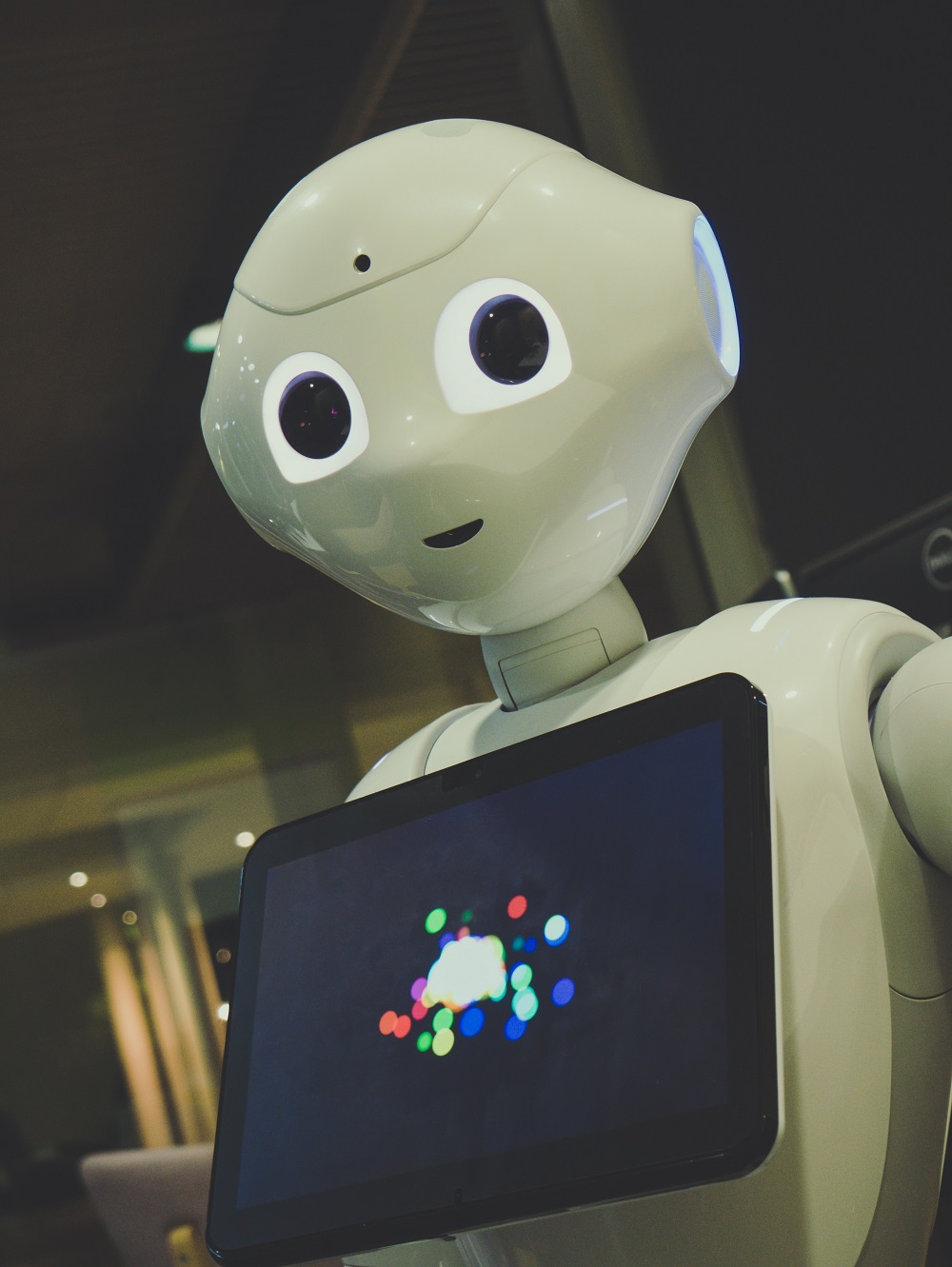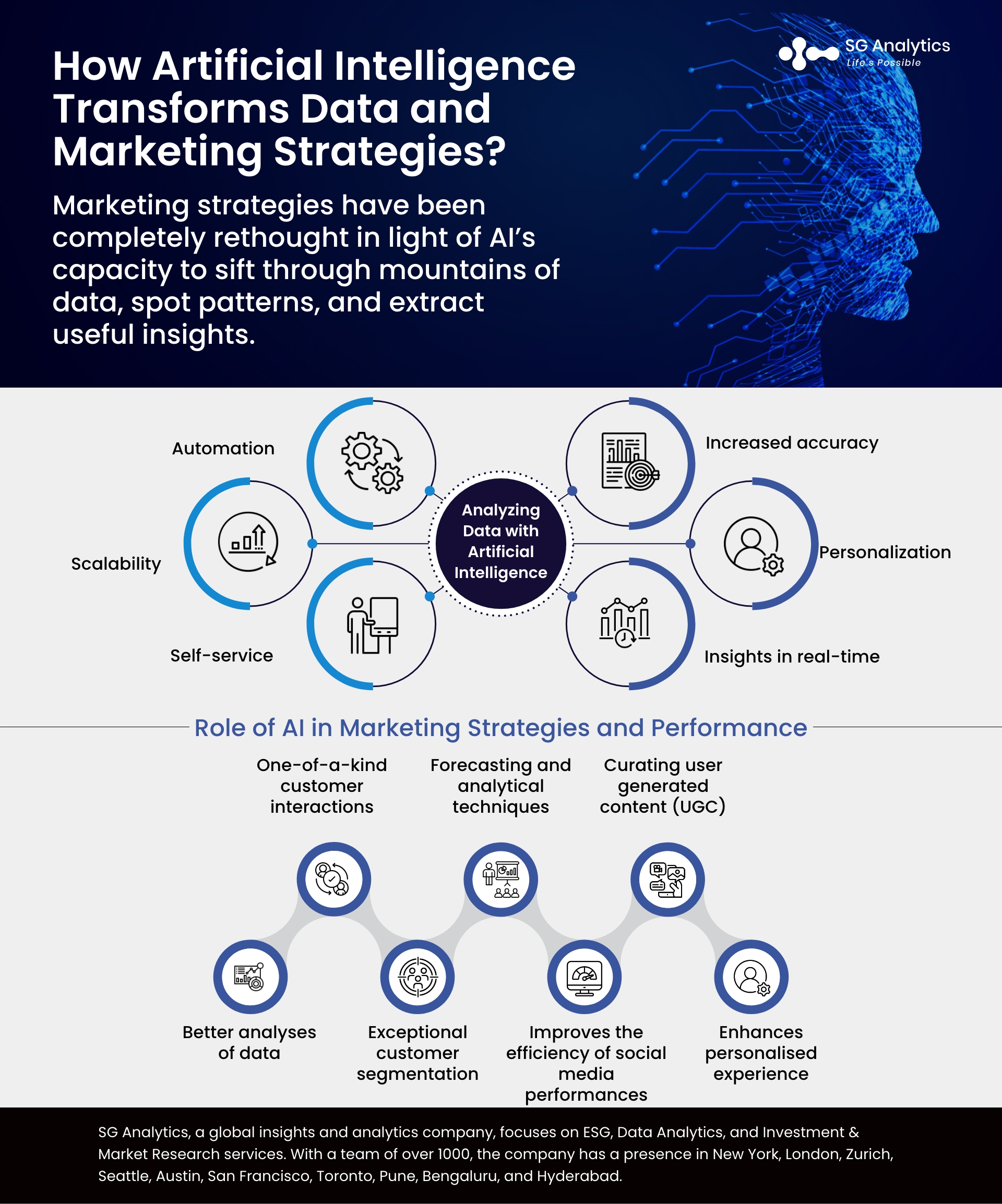Marketing experts in today's digital world are always on the lookout for fresh approaches to reaching their customers and expanding their businesses. Among the most transformative factors in this effort has been the introduction of AI into advertising.
Marketing strategies have been completely rethought in light of AI's capacity to sift through mountains of data, spot patterns, and extract useful insights. Campaigns are becoming more efficient and effective than ever before because of the use of AI and its ability to process large amounts of data and provide relevant insights.
Let’s look at how AI is influencing the future of marketing and helping firms achieve previously unattainable levels of success.

Using Data in Marketing Strategies
Data is one of the most important components of modern marketing. The days of development being driven only by a marketer's intuition and ingenuity are over. The ability to gather, analyze, and use data has become crucial in modern marketing. But what does data actually do and how can it be leveraged to drive growth in marketing strategies? Growth marketers now rely heavily on data for everything from client acquisition and retention to product development and communications.
Growth marketing, in its simplest form, is a strategy based on the analysis of client acquisition and retention data that tries to accelerate company expansion. Growth marketing, in contrast to more conventional approaches that may place more emphasis on creating a name for a product or service, is geared towards increasing tangible, financial outcomes.
But how does that work in the real world? Growth marketers may employ a wide range of strategies to expand their clientele, including search engine optimization (SEO), paid advertising, email marketing, and social media campaigns. Then, they'd use data to analyze and improve the efficacy of these efforts by monitoring key indicators like conversion rates, CAC, and LTV.
Growth marketing relies heavily on testing and tweaking in order to find what approaches are most successful and then doubling down on them. A willingness to take chances and try new things, as well as an in-depth knowledge of the intended market and the advertised product or service, are essential. Marketers may make greater use of data to generate results and maximize growth potential if they have a firm grasp on the fundamentals of growth marketing.

Analyzing Data with Artificial Intelligence
AI-powered software has the capability to automatically analyze data from any source and generate valuable insights. The potential of data collected from customers and analyzed by AI to revolutionize product creation, boost team efficiency, and inform businesses of their successes and failures is immense.
Traditional software demands continual human interaction. When introducing a new procedure or modifying an existing one, the code should be managed by an expert.
AI software that makes use of ML, on the other hand, needs just minimal human supervision initially. This helps AI tools learn from the training data that consists of text samples that have been "labeled" using AI algorithms. They successfully use data that has been labeled by humans in order to learn how to analyze patterns.
AI is having a substantial impact on data analytics in several ways:
Automation
Artificial intelligence systems can automate the processing and analysis of big datasets, freeing up human resources for more difficult tasks
Increased accuracy
Models driven by AI can find insights and patterns in data that people miss, allowing for superior prediction and judgment.
Scalability
It would be impractical or impossible to process such a vast and complex dataset manually, but AI makes this possible.
Personalization
Improved customer happiness and more revenue are the results of AI-powered models' analysis of individual customer data and the generation of tailored recommendations.
Self-service
The intuitive interfaces and automation of complex operations provided by AI-powered solutions are empowering non-experts to do data analytics.
Insights in real time
With the help of AI, organizations now have the ability to analyze their data in real time and make decisions based on the most recent data available.

Role of AI in Marketing Strategies and Performance
AI is impacting almost every industry in the market. All the businesses and companies can utilize AI for their marketing and other aspects of business.
Better Analyses of Data
The use of artificial intelligence (AI) in marketing research has been a game-changer. Data analysis has been completely transformed by the incorporation of several artificial intelligence program into a marketing strategy. Analytics solutions driven by AI excel at digesting massive amounts of data, revealing previously undiscovered insights. Artificial intelligence algorithms help marketers make data-driven decisions by revealing patterns in consumer behavior and market trends. This allows them to fine-tune their tactics for the best possible results.
One-of-a-Kind Customer Interactions
The idea of customized advertising has been given a boost by AI. Marketers can now examine client information using AI algorithms. For example, one's tastes, online habits, and purchases can be used to provide customized services. AI allows for more personalized client interactions, from content creation to product suggestions. This leads to happier customers who are more likely to stick around.
Exceptional Customer Segmentation
Marketers can now accurately do sophisticated client segmentation using AI. Marketers can divide their target demographics into several subgroups, each with their own set of preferences and habits, by employing AI-driven algorithms. With this level of insight, they can target specific audiences with messages and campaigns that are more likely to resonate with them and ultimately lead to more conversions.
Forecasting and Analytical Techniques
Marketers can use AI-enhanced predictive analytics to give themselves a leg up on the competition. Artificial intelligence algorithms are able to effectively predict future events by analyzing past data, market patterns, and external influences. Marketers may now respond to changing conditions with this skill. In addition, it found better ways to allocate resources and anticipated new opportunities. Finally, it aids in getting a leg up on the competition.
Improves the Efficiency of Social Media Performances
The primary function of social media in the context of a business is to attract and convert customers. The same goes for advertisers and marketers, who study their audience's demographics to tailor their social media posts to them. When it comes to this, AI is a total game-changer. Tools enabled by artificial intelligence enable analysis of customer preferences and behaviors beyond simple demographics. Marketers use this information to improve client engagement by adjusting their SMM strategies.
Curating User-Generated Content (UGC)
In case you didn't know, today's social media users are formidable in their dual roles as content producers and consumers. The vast majority of consumers today prefer UGC over advertisement when making a purchase decision. User-generated content (UGC) is helping businesses boost their standing in the eyes of their rivals. Your brand's mentions on social media can be monitored with the help of AI technology. In this approach, you can learn how your customers feel about your company and its offerings. By mining user-generated content, AI can isolate reliable customer information. Artificial intelligence can now recognise visual stuff like photographs and videos in addition to text.
Enhances Personalized Experience
Personalizing the company's content creates a more interactive experience for the customer. Do you realize that AI also dominates in this area? The ability to tailor services to each individual consumer is predicated on a firm's familiarity with their specific requirements. Artificial intelligence (AI) gathers, processes, and uses customer data to create unique profiles and content for each user. You can utilize this data to make highly personalized recommendations and interactions with your customers. With the use of AI, businesses can create targeted email marketing content instead of sending out generic emails.
The Future of AI in Marketing and Advertising
In recent years, AI has made waves in many fields, and the business of advertising and selling is no exception. The proliferation of AI technologies has allowed businesses to simplify operations, automate routine jobs, and base choices on hard facts. Artificial intelligence (AI) has the potential to revolutionize the way that firms approach marketing and sales, from lead creation to client interaction.
Increased productivity is one of AI's primary contributions to the field of marketing and sales. Artificial intelligence systems like ChatGPT, for instance, may speed up the process of producing material like emails and slogans. Similarly, marketing and sales efforts might find fresh ideas in the banners and graphics generated by AI-powered design tools.In today's fast-paced corporate climate, utilizing AI in marketing and sales is crucial. For instance, AI systems may examine voluminous client data and reveal insights into purchasing trends, allowing businesses to tailor their marketing efforts and boost conversion rates.
Chatbots, predictive analytics, and personalized email marketing are just a few of the AI-powered technologies that may help businesses optimize their processes, get insights, and expand their customer base. For example, AI may be used to compose a series of very specific and appropriately targeted emails for various market niches and business sectors. Email marketing, being one of the greatest ROI marketing channels, may benefit from this easy use of AI.
Augmented reality (AR) is another area where AI is expected to have a significant impact. Advertising and marketing campaigns are already using augmented reality to let clients virtually try on garments or see how new furniture might appear in their homes. It is expected that as AI develops, augmented reality experiences will become ever more personalized and engaging, allowing businesses to interact with customers in novel ways.

It is also anticipated that AI will help refine and enhance targeting and personalisation. Artificial intelligence's ability to sift through mountains of data and draw conclusions from that information will allow businesses to better understand their customers and provide them with relevant, customized experiences.
The risks and difficulties that come with these new possibilities are also new. The ethical and transparent use of AI that safeguards client privacy will need vigilance on the part of businesses. There may also be effects on the economy and labor force from AI's continued automation of tasks and decision-making processes.
Positive and Negative Impacts of AI
Artificial intelligence (AI) is changing the face of advertising in profound ways. Using AI, marketers can streamline their processes, tailor their interactions with customers, and gain deeper insights into their habits. The influence of AI in marketing is extensive and expanding. With AI's potential to revolutionize the marketing industry, it's important for marketers to determine if the technology is a good fit for their operations.
Both the advantages and disadvantages of incorporating AI into marketing strategies are discussed.
The positive impact of AI on Marketing:
New AI-powered marketing tools and techniques are still finding their footing, but their potential to revolutionize the industry is clear. Customer segmentation and targeting are two areas where AI has the potential to have a major impact. By analyzing customer data and behavior, marketers may divide their target audience into smaller groups and tailor their messages to each subset. As a result, interaction quality, conversion rates, and client loyalty can all improve.
Email campaigns, social media management, and content production are just some of the marketing activities that may be automated with the help of AI. Marketers can save money, time, and effort by having these processes automated. Personalization of service and support for customers is another way in which chatbots and virtual assistants powered by AI may boost satisfaction and decrease downtime.

AI has several Positive Impacts on business and Marketing:
- Chatbots improve customer service and reduce inbound queries.
- Website product recommendations should be improved.
- Create tailored campaigns by segmenting audiences.
- Customer satisfaction can be assessed via sentiment analysis.
- Detection of fraud.
- Process automation improves efficiency.
- Improving service speed or consistency.
The negative impact of AI on Marketing:
AI can assist your marketing strategy. However, there are drawbacks and limitations to the productivity of AI in marketing, including:
- Human connection cannot be replaced by machines.
- AI predictions and assessments can occasionally be incorrect.
- They necessitate massive amounts of relevant data as well as human intervention.
- Human inventiveness is lacking in AI.
Also read - How AI is going to Change Digital Marketing in 2023?

To Sum Up
The importance of AI and its usage is expected to increase as technology continues to develop. Artificial intelligence (AI) is revolutionizing the marketing industry in several ways. It enhances data analysis, enables personalized experiences for consumers, facilitates advanced segmentation, and empowers predictive analytics. Businesses can enhance their marketing outcomes by leveraging AI to make informed decisions based on data, deliver tailored communications to customers, and optimize their operational processes.
However, it must be kept in mind that AI is not a silver bullet that can completely supplant human ingenuity and imagination. It's a potent instrument for extending and improving human potential. Successful advertisements require a careful balancing act between the insights provided by AI and the knowledge and experience of the marketer.
The digital world is always changing, therefore businesses need to adapt their marketing tactics to take advantage of AI. It's crucial to your success in the marketplace. Businesses may successfully navigate the complex marketing landscape by utilizing AI's data-driven insights, customization, segmentation, and predictive capabilities. Therefore, it aids in producing previously unimaginable outcomes. Human ingenuity combined with AI-generated insights is the key to marketing's bright future. It may pave the way for more effective and fruitful campaigns.
Partnering with global technology companies across market research and scalable analytics, SGA’s Technology Services can help you with Research & Analytics Services and more. We supplement our desk research capabilities with active primary research and analytics capabilities.







